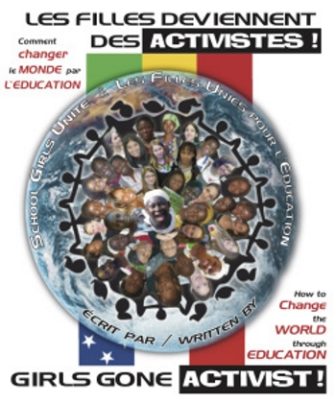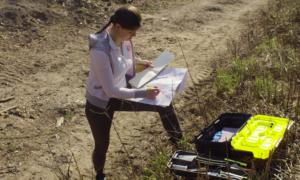 Edited by Joanne Conelly, Gaëlle Dessus, Anna Diarra, et al.
Edited by Joanne Conelly, Gaëlle Dessus, Anna Diarra, et al.
Youth Activism Project, School Girls Unite
118 pages. $16 paperback. Free full-color PDF download.
A few years ago, a small group of seventh-grade girls in Maryland were shocked to learn that their peers in developing countries must pay to attend school. Families in poverty can barely afford their sons’ education; daughters as young as 9 get married instead of going to school. Founding School Girls Unite, an organization “to let the whole world know,” these girls formed a mission: “Tackling prejudice against girls worldwide and expanding their freedom and opportunities through education.”
They found partners in the French-speaking West African nation of Mali, where only 15 in 100 females know how to read. A few of the rare girls attending high school and college in Mali formed a sister organization, Les Filles Unies pour l’Education.
The American group raises money to send 75 girls in Mali to school each year, while the group in Mali visits the sponsored girls’ villages to see how they are doing. Both groups inspire others to address the worldwide education problem. They also lobby their national leaders to hasten efforts to fulfill the United Nations Millennium Development Declaration, which promises that gender disparity will be eliminated by 2015, with every child around the world receiving primary schooling.
In her foreword, Wendy Schaetzel Lesko, a leader in civic engagement through her Youth Activism Project, discusses how this collaboration began, with brainstorming among girls she brought together with young African women in the Washington, D.C., area. Lesko is a guiding force as coordinator of School Girls Unite.
In this action guide, 13 contributors from Les Filles Unies and 28 from School Girls Unite explain why educating girls is a key to solving such global problems as poverty, HIV/AIDS, hunger, war and sexism. The book features text in English on the left-hand pages and in French on the right. Black-and-white photographs show both groups in action, along with the children in Mali whom they support. Bulleted lists, bold type and inset quotes from youth make the pages easy to digest.
Clear instruction in basic skills of activism include public-speaking tips; a pep talk on being assertive in promoting your cause; communications etiquette, such as asking the school principal for permission to campaign; fundraising ideas, from selling pencils to putting on an elaborate dance soirée in Mali; getting media attention, like the photo-op the American girls scored with Hillary Clinton; and lobbying.
This treasury of encouragement and strategies can serve as a handbook for any youth-led cause. Videos and links on the girls’ website offer more tools for helping others join them in making this girls’ education movement global. (800) 543-7693, http://www.schoolgirlsunite.org.































